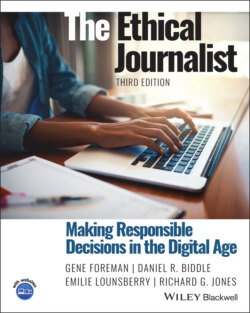Читать книгу The Ethical Journalist - Gene Foreman - Страница 21
The Growth of Ethics Codes
ОглавлениеFor reasons that are explored in Chapter 3, journalism matured in the second half of the twentieth century. During this period, it became common for individual news organizations to articulate their ethics standards in comprehensive codes, which could be useful guides in decision‐making about the news. Today, not only professional organizations of journalists, but also individual news sites, broadcast stations, and newspapers typically have ethics codes.
There is a distinct difference in the effect of the codes adopted by organizations of professional journalists and those adopted by individual newsrooms. Although the codes of professional organizations fulfill an important purpose of establishing profession‐wide standards, they are voluntary and cannot be enforced. But, when a newsroom adopts a code, violations can be addressed by suspending or dismissing the violators. Of course, codes are valuable only to the extent that they are practiced, and newsroom leaders have a responsibility both to enforce their codes and to set an example of propriety.
Journalists new to the profession may be surprised to find that the rank‐and‐file reporters, editors, and photojournalists often are more effective than their bosses in enforcing the code. John Carroll, when he was editor of the Los Angeles Times, said that among journalists “certain beliefs are very deeply held,” and that the core of these beliefs is a newspaper’s duty to the reader – that is, the news consumer, the audience, no matter how the news is delivered.
Carroll said, “Those who transgress against the reader will pay dearly,” adding that this intensity usually is masked by a laid‐back newsroom demeanor. “There’s informality and humor, but beneath the surface lies something deadly serious. It is a code. Sometimes the code is not even written down, but it is deeply believed in.”4 See John Carroll’s Point of View essay, “A ‘Tribal Ferocity’ Enforces the Code,” at the end of this chapter for more of his thoughts on the subject.
